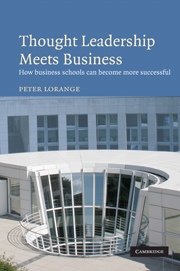Book contents
- Frontmatter
- Contents
- List of figures
- List of tables
- Foreword
- Preface
- 1 Background and conceptual framework
- 2 Key academic programs and academic value-creation
- 3 The critical role of R&D
- 4 Marketing strategy
- 5 Institutional learning
- 6 Human resources strategy
- 7 The learning partner perspective
- 8 Business school leadership issues
- 9 Conclusion: So, what are the key success factors?
- Appendix I
- Appendix II: core references
- Index
2 - Key academic programs and academic value-creation
Published online by Cambridge University Press: 22 September 2009
- Frontmatter
- Contents
- List of figures
- List of tables
- Foreword
- Preface
- 1 Background and conceptual framework
- 2 Key academic programs and academic value-creation
- 3 The critical role of R&D
- 4 Marketing strategy
- 5 Institutional learning
- 6 Human resources strategy
- 7 The learning partner perspective
- 8 Business school leadership issues
- 9 Conclusion: So, what are the key success factors?
- Appendix I
- Appendix II: core references
- Index
Summary
To fuel imagination and innovation, learning must be continuous and applied creatively and rapidly. New ways of thinking, diverse perspectives, leadership courage and smart execution will characterize the next generation of successful organizations. In order to win, tomorrow's successful executives will have to combine insight with the art and science of management.
Paul Strebel and Tracey KeysKEY POINTS
Increasingly, the bulk of a business school's academic programs will be aimed at leading executives who are also learning partners.
However, an elite MBA program will also be a significant factor, as it ensures that there is proper in-depth treatment of new knowledge, over a sufficient number of classes, to guarantee academic value-creation. MBAs are also important learning partners!
Open-enrollment executive programs ensure breadth of participation by executives from many leading companies and countries. The learning effect of the “global meeting place” can be significant.
Tailored, in-company programs ensure in-depth treatment of a specificffic company's strategic issues, often via “action learning,” to come up with implementable results.
Open-enrollment executive programs and in-company programs complement each other; both offer unique sources of learning, and leading companies-cum-learning partners would make use of both.
Both types of programs complement each other financially too. Open-enrollment programs have a high upside financial potential, when the class is full! In-company programs are offered for a fixed fee – more financial stability, but less financial upside.
- Type
- Chapter
- Information
- Thought Leadership Meets BusinessHow business schools can become more successful, pp. 32 - 67Publisher: Cambridge University PressPrint publication year: 2008



